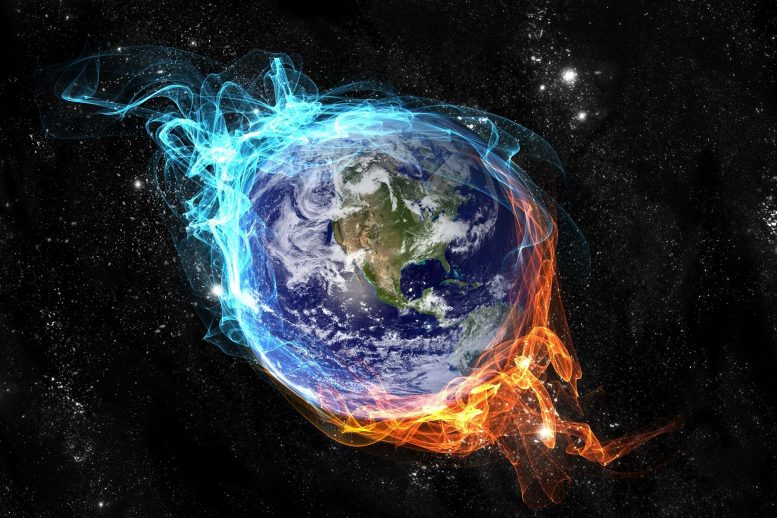
A new study analyzed public opinion on Bioenergy with Carbon Capture and Storage (BECCS), a divisive energy technology featured in the UK’s net-zero plan for 2050. The study identified eight key storylines in media coverage, ranging from viewing BECCS as a “Necessary mitigation tool” to labeling it “Worse than coal,” and found that the battle for public opinion on BECCS is far from settled.
A recent study delves into the polarizing public discourse surrounding a controversial energy technology. Supporters argue that it’s essential for fighting climate change, while detractors claim it’s even more harmful than coal.
Bioenergy with carbon capture and storage (BECCS) features heavily in the UK government’s plan to achieve a net-zero economy by 2050. However there is low public awareness of the technology, which has split the opinion of scientists, politicians, and media outlets.
BECCS generates energy by burning plants and trees and captures the resulting carbon dioxide (CO2) emissions, storing them underground.
Now, research by the University of Southampton has analyzed coverage of BECCS in 166 newspaper articles to identify the key storylines about the energy technology and understand whether it is likely to be accepted by people in the UK and beyond.
“With public understanding of BECCS so limited, the media has a crucial role in shaping debate and opinion on the technology,” says Caspar Donnison, Research Fellow in Biological Sciences at the University of Southampton and lead author of the research.
“We’ve seen in the fracking debate how competing storylines are used to influence social acceptance of a new technology, and ultimately whether it becomes part of the UK’s energy mix or not.”
The research published in Energy Research & Social Science identified eight key storylines. On the Pro-BECCS side were Necessary mitigation tool; Keeping the lights on; Anchor for transition; and Revolutionary technology. On the Anti-BECCS side were Worse than coal; Environmental disaster; No silver bullet; and Distraction.
“Sustainable biomass” to “level up the North”
The Necessary mitigation tool storyline was apparent in over half of the national and regional newspaper articles analyzed. Drax Group has plans to operate the world’s largest BECCS facility at its power station in Yorkshire. Drax CEO Will Gardiner used this storyline more than any other individual. But it was also referenced by Government spokespeople, the UK Committee on Climate Change (CCC), and Microsoft, as well as being featured in IPCC scenarios. The Keeping the lights on storyline was less prevalent but gained traction following Russia’s invasion of Ukraine.
Storylines focusing on opportunity (Anchor for transition and Revolutionary technology) were most prominent in Yorkshire’s local media. Local MPs referred to “closing the North-South divide” and Rishi Sunak MP described the Drax project as “transformative for the region’s economy”, shortly before becoming Prime Minister.
“Drax’s proposals in Yorkshire have had a major influence on the UK debate, driving more articles from three regional newspapers than all the national coverage combined,” says Professor Gail Taylor, co-author of the paper and John B Orr Distinguished Professor of Environmental Plant Sciences, University of California, Davis. “The pro-BECCS coalition enjoyed greater dominance in local news media, where the necessity framing was complemented with the promise of socioeconomic benefits to the region.”
“Ecological disaster” and “magical thinking”
The Worse than coal storyline gained prominence following a BBC Panorama documentary on Drax’s supply chain and was featured in 34 articles – mostly in national newspapers. Environmental NGOs and others claim, with limited evidence, that biomass combustion results in similar CO2 emissions to coal, that this carbon may not be re-absorbed by replanting trees, and that supply-chain emissions add to the carbon cost. 32 articles framed BECCS as an Environmental disaster, suggesting the land-use demand posed a risk to wildlife and food production.
Countering the Revolutionary technology narrative, 23 national newspaper articles (17 in the Guardian) suggested BECCS was No silver bullet, describing it as “too good to be true” and “not feasible” at the scale and timescale envisaged. A further 10 articles in the Guardian and Independent, largely attributed to NGOs, suggested it was a Distraction, acting as “a license to keep emitting.”
“The UK government is relying on BECCS to help deliver their net-zero strategy but the battle for public opinion is far from won,” says Donnison. “Our research shows a targeted, limited deployment of BECCS using sustainably sourced biomass could have broad national appeal. But if public concerns aren’t addressed, the government will have to look to a fast-diminishing list of alternative technological and policy options.”
Reference: “A net-zero storyline for success? News media analysis of the social legitimacy of bioenergy with carbon capture and storage in the United Kingdom” by Caspar L. Donnison, Karolina Trdlicova, Alison Mohr and Gail Taylor, 9 June 2023, Energy Research & Social Science.
DOI: 10.1016/j.erss.2023.103153
The study was funded by the UK Energy Research Centre.









If we think of the universe in terms of simple geometry, it becomes rather obvious, very quickly that to solve any problem as to a lack of energy is to simply move a high energy source to where you need it without any combustion required. However; where’s the profit in that? And, so you suffer for no other reason than for a near total lack of imagination. Lots of luck, but no doubt you’ll never figure it out.
“…, and that supply-chain emissions add to the carbon cost.”
Not only that, but the equipment needed to capture and transport the CO2, to drill the hole(s) in which to dispose of the CO2, and seal the repository once it is filled to capacity, reduce the net energy available. Looked at that way, there might be other low-energy sources, such as geothermal heat, that might be better overall because it doesn’t have the energy-overhead reducing the net amount. The proposed carbon-capture schemes, and alternatives, need to be examined carefully from start to finish to select the one with the least environmental impact and the greatest net energy produced.
Geothermal heat is not great, simply because there is not enough of it around, even if we fully utilized all the available thermal resources it wouldn’t put a big enough dent in the climate problem. (possibly we should still do it, but I can see the dangers with the tech as well)
Geyser fields or anomalously hot areas are indeed rare. But, I wasn’t thinking of them. More along the lines of heat pumps.
Hot brines are difficult to work with because they are not only highly corrosive, but they tend to clog up piping and heat exchangers with precipitated minerals. They have unusual maintenance costs and may well have to have their infrastructure replaced before it is fully amortized. The condensates often have environmentally problematic elements — like arsenic and sulfuric acid.